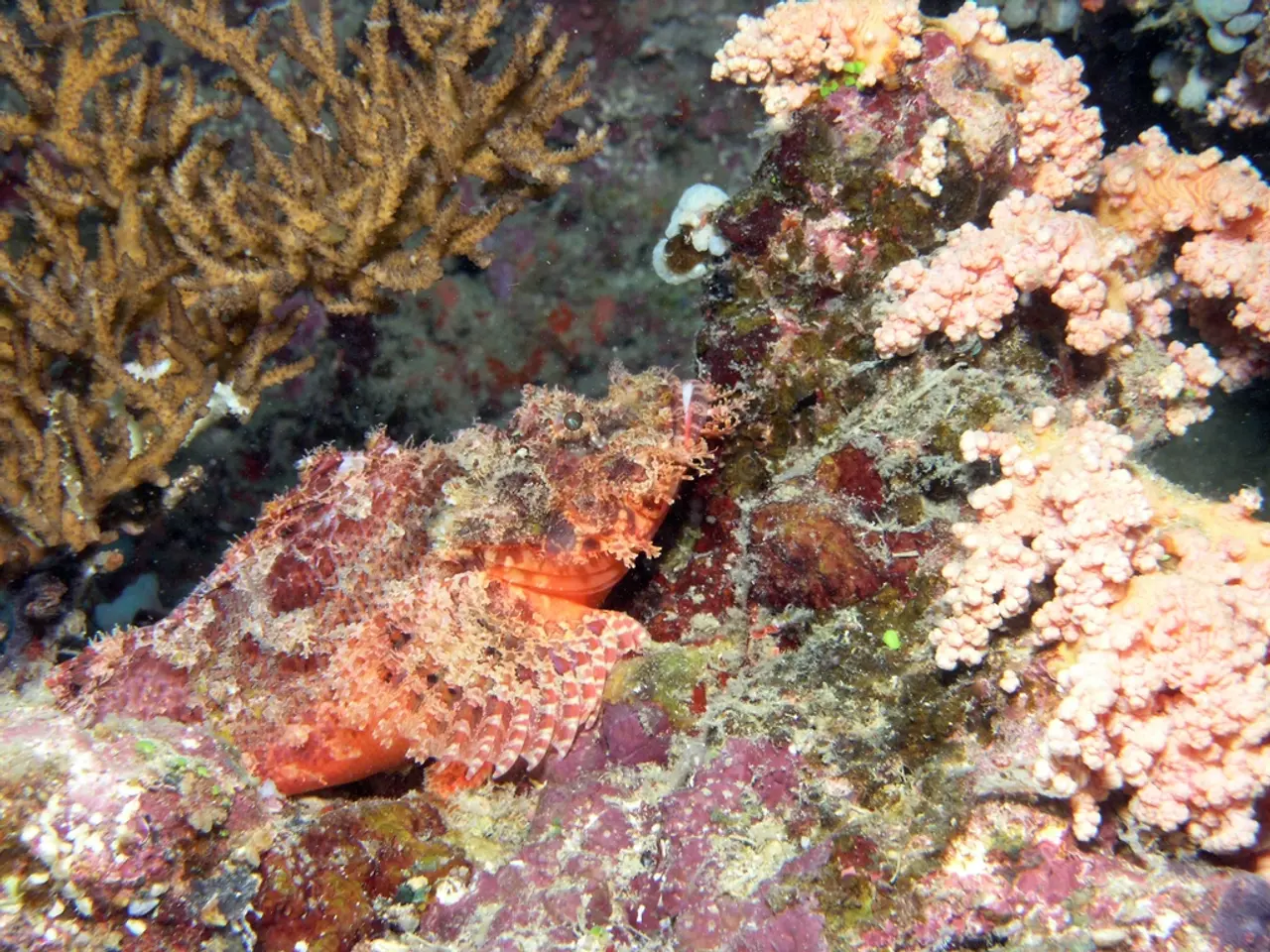Redefining financial strategies for the ocean environment
The ocean, a vast and largely unexplored realm, may contain three times more marine species than currently identified [1][5]. As we delve deeper into this mysterious world, the need to protect and conserve it becomes increasingly urgent.
To address this challenge, various initiatives are underway. The 2025 Ocean Investment Protocol offers a practical roadmap for financial institutions, insurers, and development banks to manage ocean-related risks and unlock investment opportunities that support SDG 14, "Life Below Water" [1][2][3][5]. This roadmap is crucial in guiding the financial sector towards sustainable ocean investments.
One such initiative is the Nautilus Blue Guarantee Company, which offers guarantees for investments in six key blue-economy sectors, including sustainable seafood, ocean conservation, and blue infrastructure [1][3]. These guarantees aim to unlock private capital for projects that contribute to ocean health and sustainability.
The financial sector's role in ensuring ocean health is non-negotiable for the planet and humanity [4]. To meet investor expectations and mobilize adequate finance, innovative financing solutions are being developed. These include loan guarantees, blended finance, project aggregation, and frameworks like the 2025 Ocean Investment Protocol [2][3][5].
Financial institutions, such as Deutsche Bank, are enhancing their due-diligence policies to align with global frameworks like the Sustainable Blue Economy Finance Principles and joining alliances like the Ocean Risk and Resilience Action Alliance (ORRAA) to institutionalize sustainable ocean investment [1][3].
However, challenges remain. The limited scalability of many ocean projects, scarcity of investable offerings, implementation difficulties of frameworks, and data gaps are significant hurdles [2][3][5]. Despite these challenges, the financial sector is actively developing tools to standardize definitions, improve transparency, and scale financing to meet both real-world impact and financial return expectations from private and institutional investors [2][3][5].
The marine biotechnology market is projected to reach US$6.4 billion by 2025 [6]. This growth underscores the potential for sustainable ocean-based industries to drive economic growth while protecting the ocean's health.
In Southeast Asia, the Blue SEA Finance Hub is designed to help economies structure their blue-economy investments [7]. Notable recent efforts in the wider market include a collaboration between an environmental organization and a major global insurance provider to develop reef insurance products [8].
The Korean Ocean Business Corporation successfully issued a US$300 million blue-bond in April, demonstrating that investors respond to a convincing rationale [9]. Fisheries sustain 600 million people, mostly in developing countries [10]. By the end of the United Nations Ocean Conference in June 2021, 50 countries had ratified the UN High Seas Treaty, with 19 more promising to do so in 2021 [11].
However, the Global Ocean Health Index dropped sharply in 2024, with declines in habitat, species, and iconic species [12]. Improving and scaling up "blue finance" requires determination, commitment, and continued innovation to create and institutionalize investable solutions.
In conclusion, sustainable ocean finance currently prioritizes integrated ocean health management through targeted objectives and employs innovative financial tools like blended finance and loan guarantees to attract and meet diverse investor demands for both impact and profitability. Collaboration between private banks, development banks, and financial institutions in developing countries is key to creating these investable solutions [2][5].
References: [1] The 2025 Ocean Investment Protocol [2] The Ocean Panel [3] Deutsche Bank [4] Ocean Risk and Resilience Action Alliance (ORRAA) [5] Sustainable Blue Economy Finance Principles [6] MarketsandMarkets [7] Blue SEA Finance Hub [8] Coral Reef Reinsurance [9] Korean Ocean Business Corporation [10] Food and Agriculture Organization of the United Nations [11] United Nations [12] Global Ocean Health Index
- The 2025 Ocean Investment Protocol, a roadmap for financial institutions, is crucial in guiding the financial sector towards sustainable ocean investments that support SDG 14, "Life Below Water."
- Financial institutions, such as Deutsche Bank, are developing innovative financing solutions, like loan guarantees and blended finance, to meet investor expectations and mobilize finance for projects contributing to ocean health and sustainability.
- The marine biotechnology market is projected to reach US$6.4 billion by 2025, highlighting the potential for sustainable ocean-based industries to drive economic growth while maintaining the ocean's health.
- To meet the challenges in ocean projects, such as limited scalability and data gaps, the financial sector is actively working on standardizing definitions, improving transparency, and scaling financing to attract private and institutional investors interested in sustainability and financial returns.




